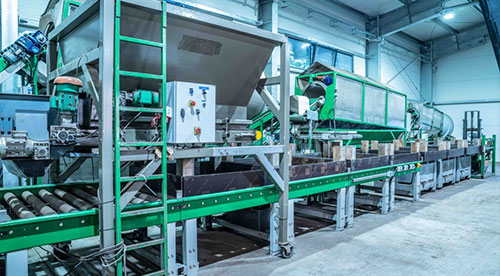
Vermicompost is a natural result of the work of Californian earthworms during the processing of organic matter. A natural, universal and safe product, made 100% by our worms. It does not contain chemical additives.
Vermicompost
Available: 15 or 50-liter bag, 1200-liter big bag, or 1500-liter pallet
Used regularly, it has a very beneficial effect on the growth, development and yield of plants.

Composition:
Vermicompost is a rich source of organic matter and minerals. Organic matter - at least 30% dry mass - pH 6.5The effect of using the product is the improvement of biological activity and the physico-chemical properties of the soil. When used regularly, it has a very beneficial impact on the growth, development, and yield of plants.
Application:

Before laying a lawn: Spread 2-4 kg per m² and mix with the topsoil using a rototiller.
On existing lawns: Spread 1-2 kg per m², rake, roll, overseed, and water.
In other crops before planting: Spread evenly at a rate of 1-2 kg per m² and mix with the topsoil.
On existing plantings: Distribute evenly at a rate of 0.5-1 kg per m², then water.
Vermicompost is a natural fertilizer produced by earthworms.
Vermicompost acts as a soil amendment because it is rich in beneficial soil bacteria that develop during the digestion of organic matter by earthworms and are transformed into a form easily absorbed by plants. Additionally, it enriches the soil with a range of microorganisms that stimulate soil microbiological activity and detoxify pathogens, nematodes, and heavy metals.
What are coprolites?
Coprolites are the excrement of earthworms. They have a loose, granular texture, dark color, and stable structure. They resemble humus in appearance and have similar effects—they improve soil structure, aerate it, and enhance its fertility. This is because vermicompost contains high amounts of enzymes and microorganisms that, when introduced to the soil, stimulate its biological life. Often, soil may be rich in organic matter, but due to a lack of biological activity, these substances are inaccessible to plants.
The quality of vermicompost is measured by the amount of coprolites in the compost. In other words, it is the ratio of the material processed by earthworms to the remaining "unprocessed" material. The higher the content of coprolites in the compost, the better its quality.
The beneficial microorganisms contained in vermicompost, when introduced into the soil, activate the mineral nutrients that were previously unavailable to plants. Thus, after adding biohumus to the soil, the levels of macro- and microelements available to plants significantly increase, and toxic heavy metal compounds are converted into forms that are less absorbable in the earthworms' digestive tract, preventing them from entering plants.
Due to coprolites, the soil's ability to retain water is enhanced. This increases the water reservoir available to plants during drought and reduces the leaching of nutrients into deeper soil layers. Even a small percentage of biohumus can significantly reduce the effects of soil erosion!



Send us a message!
If you would like to learn more about our offer or share your thoughts, do not hesitate to contact us. We will gladly answer any question and dispel all of your doubts.Agroindustrial Company
EKAGRO
ul. Pogodna 23, Krępa Słupska,
76-200 Słupsk, POLAND
tel. +48 664 666 626
fax +48 598472677
e-mail: office@ekagro.pl
Barbel
Burbot
Chub
Common bleak
Common bream
Common carp
Common nase
Common rudd
Eel
European perch
Freshwater whitefish
Grass carp
Ide
Prussian carp
Roach
Romanian barbel
Silver bream
Silver carp
Tench
Vimba bream
Wels catfish
Zander

